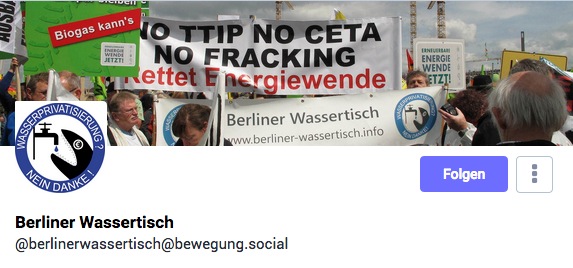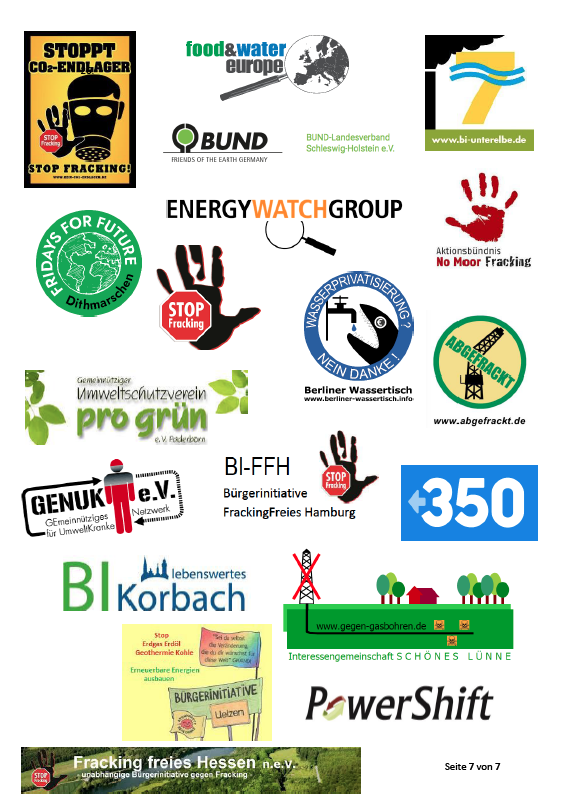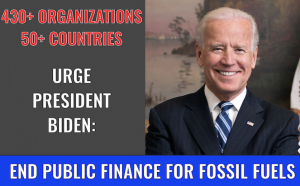
18. März 2021
To:
Secretary of the Treasury Janet Yellen
Secretary of State Anthony Blinken
Secretary of Energy Jennifer Granholm
Incoming President and Chairperson of the U.S. Export-Import Bank
Acting CEO of the U.S. International Development Finance Corporation Dev Jagadesan
Assistant to the President for National Security Affairs Jake Sullivan
Special Assistant to the President for Economic Policy Robin Colwell
Acting Chief Executive Officer, Millennium Challenge Corporation, Mahmoud Bah
Acting Director, U.S. Trade and Development Agency, Enoh T. Ebong
Special Presidential Envoy for Climate, John Kerry
We are encouraged by the Biden Administration’s initial steps to implement a ‘whole-of-government’ approach to the climate crisis, as set out in the January 27 “Executive Order on Tackling the Climate Crisis at Home and Abroad.” We are writing now to provide our recommendations on a critical piece of the international agenda described in the Executive Order — ending public support for fossil fuels around the world by “promoting the flow of capital toward climate-aligned investments and away from high-carbon investments.” We urge the Biden Administration to act swiftly to end new financing for all parts of the fossil fuel supply chain (including for gas), stop new U.S. fossil fuel support within 90 days across all government institutions, and work with other nations to end fossil fuel financing.[1]
As you know, averting the worst impacts of the climate crisis requires a rapid transition away from fossil fuels. There is simply no room left for new investments in long-lived carbon intensive infrastructure. Still, public agencies continue to provide tens of billions of dollars to finance and support such investments each year. This has to stop.
In his Executive Order, President Biden initiated three distinct inter-agency policy-making processes to address this problem.
- First, he directed Secretaries Yellen, Blinken, and Granholm to lead a process to develop a strategy to “promote ending international financing of carbon-intensive fossil fuel-based energy while simultaneously advancing sustainable development and a green recovery.”
- Second, he directed Secretaries Yellen and Blinken and Special Envoy Kerry to develop, in consultation with other relevant agencies, a “climate finance plan” that will focus on “promoting the flow of capital toward climate-aligned investments and away from high-carbon investments” within 90 days of the Executive Order.
- Third, he instructed Secretary Yellen to develop a strategy for the U.S. to use its voice and vote in international financial institutions to promote initiatives that are “aligned with and support the goals of the Paris Agreement.”
Each of these processes addresses an important part of the overall challenge of eliminating the flow of public money to fossil fuel infrastructure. The goal should be consistent across these processes: to articulate policies that are based on climate science, comprehensive in their scope — covering all institutions, all fossil fuels, and all stages in the value chain — and stringent in their requirements.
Background
Climate science shows that we need a rapid transition from fossil fuels, the single biggest source of global greenhouse gas emissions, to renewable energy in order to limit global warming to 1.5ºC. The IPCC’s P1 trajectory, which takes a precautionary approach to negative emission technologies, shows that the use of coal, oil and gas needs to drop by 78%, 37% and 25% respectively by 2030 compared to 2010 levels to keep warming limited to 1.5ºC. According to the 2020 UNEP Production Gap report, between 2020 and 2030, global coal, oil, and gas production would have to decline annually by 11%, 4%, and 3%, respectively, to be consistent with a 1.5ºC pathway. And in the electricity sector, there is no carbon budget left to build new gas and coal-fired power plants — many existing ones will need to be retired before the end of their normal economic lives. This means we should be focused on retiring fossil fuel infrastructure, and stop financing new infrastructure.
Despite the need to rapidly reduce fossil fuel production and use, G20 governments have provided more than three times as much in public finance for fossil fuels as for renewable energy every single year since the adoption of the Paris Agreement. U.S. institutions, such as the U.S. Export-Import Bank (EXIM) and the U.S. International Development Finance Corporation (DFC) (and its predecessor, the Overseas Private Investment Corporation) have provided billions for new fossil fuel projects annually, together averaging $4.4 billion per year over the past decade.
The good news is that by acting decisively, the Biden Administration can accelerate a global shift away from public finance for fossil fuels. The plan to end international public finance for fossil fuels that results from this Executive Order should be extensive — applying across the value chain for all oil, gas, and coal — and should apply to all U.S. international public finance across its bilateral institutions and its engagement in multilateral institutions. The plan should be implemented immediately to halt U.S public finance for fossil fuels.
Over the past 18 months, other leading governments and institutions have taken important steps to shift away from government-backed finance to the fossil fuel industry:
- In late 2019, the European Investment Bank — the world’s largest multilateral lender — passed a new Energy Lending Policy that will end virtually all its support for oil, gas, and coal by the end of this year. This month, its president pronounced “gas is over.”
- Late last year, the UK, holding the COP26 Presidency, announced “the UK will end taxpayer support for fossil fuel projects overseas as soon as possible,” including bilateral development finance, export finance, trade promotion, and UK MDB positions.
- On January 25, 2021, the European Council adopted new conclusions on energy and climate diplomacy, including that “European Union energy diplomacy will discourage all further investments into fossil fuel based energy infrastructure projects in third countries[…]” and a renewed call for “a global phase-out of environmentally harmful fossil-fuel subsidies along a clear timeline.”
This momentum builds on policy commitments to exclude finance for coal-fired power that the U.S. led under the Obama Administration, including through Treasury guidance, U.S. leadership at the MDBs and OECD, and through a 2013 joint commitment with other like-minded nations to end overseas coal finance that ultimately led to the Coal-Fired Electricity Generation Sector Understanding in the OECD Arrangement.
Recommendations
The Biden Administration can build on this momentum for curbing public finance for fossil fuels by pursuing a whole-of-government approach to end all U.S. public finance for fossil fuels, focusing instead on supporting climate action abroad. We, the undersigned, ask that the plans developed in accordance with the Executive Order to end international public financing of fossil fuels meet the following criteria:
Scope:
- Cover all U.S. public finance institutions, including the U.S. Export-Import Bank, U.S. International Development Finance Corporation, U.S. Trade and Development Agency, Millennium Challenge Corporation, United States Agency for International Development, and other relevant institutions. The plans should also apply to U.S. participation in multilateral institutions including the MDBs and the IMF.
- Include a strategy to partner with the UK, the EU, and other front-running countries to secure additional commitments from other governments and public finance institutions to end their public finance for fossil fuels, including at the OECD Export Credit Group and the second Finance in Common Summit.
- Apply across the oil, gas, and coal value chain (i.e., include upstream, midstream, and downstream segments), as well as for associated facilities and related infrastructure, and should apply to all funding streams and modalities, including indirect financing provided through financial intermediaries, and, in the case of the MDBs, development policy finance;
- Scale up international support for a just transition away from fossil fuels, providing support for workers and communities affected by the transition, for decommissioning and repurposing sites, and replacing fossil fuel with clean energy.
- Exclude new gas infrastructure from eligibility for all future government financing, except in extremely limited and well-defined, and closely regulated circumstances.[2] Gas is not a climate solution, nor is it a “bridge fuel.”[3] Rather, it diverts resources from less polluting, economically advantageous renewable, efficiency, storage, and other solutions that truly support decarbonization. Nor is the case for gas as a tool for energy access compelling. Recent research has shown that public finance for gas has seldom delivered significant energy access benefits, and alternatives are often more cost-effective. The UN Sustainable Energy for All initiative recently concluded that “financing of fossil fuel projects as a means of closing the energy access gap should be terminated” because it locks countries “into decades of carbon emissions, import dependency and stranded asset risk.”
Timeline:
- Develop plans for ending fossil fuel finance across all institutions as soon as possible, within the 90-day timeframe. While the Executive Order does not specify a deadline for Treasury to develop a strategy on the use of “voice and vote,” or a deadline for the specified agencies to articulate a plan to promote ending international financing of fossil fuel-based energy, we ask that strategies and implementation plans regarding “voice and vote” and international diplomacy also be completed within a 90-day timeframe, similar to what was specified for other areas such as the development of the “climate finance plan.”
- Clear Treasury guidance on the MDBs should be released as soon as possible in order to establish the U.S. position ahead of the Asian Development Bank’s forthcoming energy policy review, with a draft policy due to be released within weeks.
- Have all measures take effect soon after the completion of the plan; while also seeking comment on ways to strengthen the plans further.
- Conduct a public consultation process aimed at ensuring the outcome is as ambitious as possible.
Leadership on this agenda from the U.S. would have a considerable global impact. Thank you for your consideration of these recommendations, and we look forward to hearing from you.
[1] Nothing in this letter should suggest that the U.S. or other countries should end important bilateral support for programs seeking to improve transparency, accountability, and good governance of extractive industry operations globally or in specific country contexts; nor their support for similar critical programs carried out via multilateral institutions and initiatives.
[2] While the prospect is highly unlikely, very rare exceptions for fossil fuel projects intended solely for domestic energy consumption only in Least Developed Countries could be considered, but only after a thorough scenario analysis of all viable alternatives for meeting energy access demonstrates clear necessity and no viable alternatives.Such an assessment must consider price competitiveness over the full lifetime of the project from conception to full decommissioning, all costs of externalities, safety, and adherence to international best practices and environmental and social due diligence. Such conditions have not been demonstrated for any existing projects.
[3] The latest research on gas, particularly, U.S. LNG exports, demonstrates that lifecycle GHG emissions from gas are significantly worse than previously reported. Greenhouse gas emissions from U.S. LNG are just 27 to 33 percent lower than coal. Using more gas would not help countries meet even the modest emissions reduction targets required in the International Energy Agency’s Sustainable Development Scenario (a scenario that far exceeds a pathway that would limit warming to 1.5°C). This is true not only for using gas in Europe, but also for Japan, China and India. Over the lifetime of U.S. LNG projects, emissions will be significantly higher than clean investments such as solar, wind, storage, and efficiency measures. Lifecycle GHG emissions for solar power are less than 7 percent of LNG emissions; emissions for wind power are even lower, less than 2 percent of LNG emissions. We urge the administration to follow the latest science and exclude new gas infrastructure from eligibility for all future government financing.
Signed,
432 groups [darunter der Berliner Wassertisch] from 53 countries (listed below by region)
AFRICA (25 groups from 12 countries)
Youth for Challenge — Benin
Cartoonists for Climate — Cameroon
AbibiNsroma Foundation — Ghana
Alliance for Empowering Rural Communities — Ghana
Parlement des Jeunes Leaders de la Société Civile Guinéenne — Guinea
deCOALonize Campaign — Kenya
People’s Federation for National Peace & Development — Malawi
Association de l’Arbre — Mauritania
Comité de Solidarité avec les Victimes des Violences des Droits de L’Homme — Mauritania
Community Development Advocacy Foundation — Nigeria
Dararrafe Vocational Training Center — Nigeria
Environmental Rights Action / Friends of the Earth Nigeria — Nigeria
Health of Mother Earth Foundation — Nigeria
Innovea Development Foundation — Nigeria
Kebetkache Women Development & Resource Centre — Nigeria
Ralph Boys‘ Brigade — Nigeria
Women Rights & Sustainable Society — Nigeria
YesHub — Nigeria
Centre for Environmental Rights — South Africa
Fund Our Future — South Africa
groundWork (Friends of the Earth South Africa) — South Africa
Just Share — South Africa
Centre for Citizens Conserving — Uganda
Judith Chikonde Foundation — Zambia
Centre for Alternative Development — Zimbabwe
ASIA (31 groups from 14 countries)
Bangladesh Working Group on External Debt — Bangladesh
Coastal Livelihood & Environmental Action Network — Bangladesh
Equitable Cambodia — Cambodia
Green Camel Bell — China
Meiyouwenti / CoalProblem — China
People of Asia for Climate Solutions — China / Philippines
The Greens Movement of Georgia — Georgia
Climate Action Network South Asia — India
Climate Warriors India — India / South Asia
Environics Trust — India
Growthwatch — India
Himalaya Niti Abhiyan — India
Indian Social Action Forum — India
Morya Samajik Pratishthan — India
Movement for Advancing Understanding on Sustainability and Mutuality — India
Nadi Ghati Morcha — India
National Hawker Federation — India
Project 100 — India
Friends of the Earth Japan — Japan
Mekong Watch — Japan
350.org Japan — Japan
All Nepal Peasants Federation Association — Nepal
Youth For Environment Education & Development Foundation — Nepal
Pakistan Fisherfolk Forum — Pakistan
Asian Peoples‘ Movement on Debt & Development — Philippines / Asia
Freedom from Debt Coalition — Philippines
Solutions for Our Climate — South Korea
FIAN Sri Lanka — Sri Lanka
Mom Loves Taiwan Association — Taiwan
Climate Watch Thailand — Thailand
Green Innovation & Development Centre — Vietnam
EUROPE (41 groups from 16 countries)
Change Partnership — Belgium
Food & Water Action Europe — Belgium / Europe
Centar za ekologiju i energiju — Bosnia & Herzegovina
CEE Bankwatch Network — Czech Republic
ActionAid Denmark — Denmark
VedvarendeEnergi — Denmark
EKOenergy — Finland
Atome et Carbone — France
Friends of the Earth France — France
Reclaim Finance — France
Berliner Wassertisch — Germany
Energy Watch Group — Germany
Quantum Leap — Germany
Urgewald — Germany
Clean Air Action Group — Hungary
Fracking Free Clare — Ireland
BankTrack — Netherlands
Both ENDS — Netherlands
Concerned Citizens against Climate Change — Netherlands
Fair Finance International — Netherlands
Milieudefensie — Netherlands
Reclame Fossielvrij / Fossil Free Advertising — Netherlands
Recourse — Netherlands
Women Engage for a Common Future — Netherlands
Naturvernforbundet / Friends of the Earth Norway — Norway
Fundacja Rozwój TAK – Odkrywki NIE — Poland
Academia Cidadã – Citizenship Academy — Portugal
All Green Energies — Spain
INTLawyers — Switzerland
Catholic Agency for Overseas Development (CAFOD) — United Kingdom
The Corner House — United Kingdom
Corporate Europe Observatory — United Kingdom / Belgium
Environmental Justice Foundation — United Kingdom
Frack Free Sussex — United Kingdom
Frack Off London — United Kingdom
Friends of the Earth England, Wales & Northern Ireland — United Kingdom
Global Justice Now — United Kingdom
Otley 2030 — United Kingdom
Rapid Transition Alliance — United Kingdom
REK Rowlands & Partners — United Kingdom
Weald Action Group — United Kingdom
NORTH AMERICA (295 groups from 5 countries)
Above Ground — Canada
Catholic Divestment Network — Canada / United States
Climate Action Network Canada — Canada
Climate Emergency Institute — Canada
Environmental Defence Canada — Canada
Glasswaters Foundation — Canada
Indigenous Environmental Network — Canada / United States
New Brunswick Anti-Shale Gas Alliance — Canada
Pro-Information Pro-Environment United People Network — Canada
Stand.earth — Canada / United States
Centro Salvadoreño de Tecnologia Apropiada / Friends of the Earth El Salvador — El Salvador
Association des Citoyens pour le Développement Durable — Haiti
Milpah Honduras — Honduras
Action Center on Race & the Economy — United States
ActionAid USA — United States
Acton & Agua Dulce Democratic Club — United States
Adorers of the Blood of Christ, U.S. Region — United States
Alameda County Interfaith Climate Action Network — United States
Alliance for Climate Education — United States
Alliance for Democracy Portland — United States
Amazon Watch — United States
Amnesty International USA — United States
Animals Are Sentient Beings — United States
Athens County’s Future Action Network — United States
Aytzim: Ecological Judaism — United States
Azul — United States
Baltimore 350 — United States
Bank Information Center — United States
The Banner — United States
Beaver County Marcellus Awareness Community — United States
Ben & Jerry’s — United States
Berks Gas Truth — United States
Better Path Coalition — United States
Beyond Extreme Energy — United States
Biketopia Berkeley Workshop — United States
Blue Climate Initiative — United States
Blue Ridge Environmental Defense League — United States
Breast Cancer Action — United States
Breathe Easy Susquehanna County — United States
Broward for Progress — United States
Buckeye Environmental Network — United States
Businesses for a Livable Climate — United States
California Young Democrats Jewish Caucus — United States
Call to Action Colorado — United States
Carrizo/Comecrudo Tribal Nation of Texas — United States
CatholicNetwork.US — United States
Center for Biological Diversity — United States
Center for Climate Change & Health — United States
Center for Popular Democracy — United States
Center for a Sustainable Coast — United States
Change the Chamber / Lobby For Climate — United States
Chapel Hill Organization for Clean Energy — United States
Chesapeake Climate Action Network — United States
Christians Concerned About Climate Change — United States
Clean Energy Action Colorado — United States
Clean Energy Now Texas — United States
Climate Action Group, Unitarian Society of Northampton & Florence — United States
Climate Action Now Western Massachusetts — United States
The Climate Center — United States
Climate Equity Reference Project — United States
Climate Finance Action — United States
Climate Hawks Vote — United States
Climate Health Now — United States
Climate Justice at Boston College — United States
The Climate Mobilization — United States
Climate Refugees — United States
Climate XChange — United States
Coalition to Protect New York — United States
CODEPINK Women for Peace — United States
Alliance for Climate Education — United States
Alliance for Democracy Portland — United States
Amazon Watch — United States
Amnesty International USA — United States
Animals Are Sentient Beings — United States
Athens County’s Future Action Network — United States
Aytzim: Ecological Judaism — United States
Azul — United States
Baltimore 350 — United States
Bank Information Center — United States
The Banner — United States
Beaver County Marcellus Awareness Community — United States
Ben & Jerry’s — United States
Berks Gas Truth — United States
Better Path Coalition — United States
Beyond Extreme Energy — United States
Biketopia Berkeley Workshop — United States
Blue Climate Initiative — United States
Blue Ridge Environmental Defense League — United States
Breast Cancer Action — United States
Breathe Easy Susquehanna County — United States
Broward for Progress — United States
Buckeye Environmental Network — United States
Businesses for a Livable Climate — United States
California Young Democrats Jewish Caucus — United States
Call to Action Colorado — United States
Carrizo/Comecrudo Tribal Nation of Texas — United States
CatholicNetwork.US — United States
Center for Biological Diversity — United States
Center for Climate Change & Health — United States
Center for Popular Democracy — United States
Center for a Sustainable Coast — United States
Change the Chamber / Lobby For Climate — United States
Chapel Hill Organization for Clean Energy — United States
Chesapeake Climate Action Network — United States
Christians Concerned About Climate Change — United States
Clean Energy Action Colorado — United States
Clean Energy Now Texas — United States
Climate Action Group, Unitarian Society of Northampton & Florence — United States
Climate Action Now Western Massachusetts — United States
The Climate Center — United States
Climate Equity Reference Project — United States
Climate Finance Action — United States
Climate Hawks Vote — United States
Climate Health Now — United States
Climate Justice at Boston College — United States
The Climate Mobilization — United States
Climate Refugees — United States
Climate XChange — United States
Coalition to Protect New York — United States
CODEPINK Women for Peace, Golden Gate Chapter — United States
College Democrats of America Environmental Caucus — United States
Colorado Businesses for a Livable Climate — United States
Communities for Safe & Sustainable Energy — United States
Communitopia — United States
Community Advocates for a Sustainable Environment — United States
Compassionate Bay — United States
Compressor Free Franklin — United States
Concerned Citizens Ohio — United States
Concerned Ohio River Residents — United States
Cream City Conservation — United States
Critica — United States
Democratic Environmental Caucus of Florida — United States
Dominican Sisters of Sinsinawa — United States
Don’t Waste Arizona — United States
E3G — United States
Earth Action — United States
Earthkeeper Health Resources — United States
Earthworks — United States
EcoEquity — United States
Elders Council Center for Alaskan Coastal Studies — United States
Elected Officials to Protect America — United States
Elmirans & Friends Against Fracking — United States
Empower our Future Colorado — United States
Environmental Health Working Group, Berkeley Climate Action Coalition — United States
Environmental Justice Taskforce, Western New York Peace Center — United States
Extinction Rebellion San Francisco Bay Area — United States
Fairbanks Climate Action Coalition — United States
Faithful America — United States
Feminists in Action Los Angeles — United States
First Unitarian Portland Community for Earth — United States
Flight Free USA — United States
Food & Water Action — United States
Fossil Free California — United States
Fossil Fuel Divest Harvard — United States
Fox Valley Citizens for Peace & Justice — United States
FrackbustersNY — United States
Franciscan Action Network — United States
FracTracker Alliance — United States
The Freedom BLOC — United States
Fremont County Indivisible — United States
FreshWater Accountability Project — United States
Friends of the Earth U.S. — United States
Friends For Environmental Justice — United States
Future Coalition — United States
The Future Left — United States
FXB Climate Advocates — United States
Gas Free Seneca — United States
Gender Action — United States
Grassroots Environmental Education — United States
Green America — United States
GreenLatinos — United States
Greenpeace USA — United States
Greenvest — United States
Grey Nuns of the Sacred Heart — United States
Hawai’i Institute for Human Rights — United States
Health Care for All Colorado — United States
Healthy Gulf — United States
Heartwood — United States
Hip Hop Caucus — United States
Howard County Climate Action — United States
Human Nature Dance Theatre — United States
Humboldt Young Democrats — United States
Important, Not Important — United States
Indigenous People of the Coastal Bend — United States
Indivisible Daytona Beach — United States
Indivisible San Francisco — United States
Inland Ocean Coalition — United States
Institute for Agriculture & Trade Policy — United States
Institute for Policy Studies Climate Policy Program — United States
InterAmerican Clean Energy Institute — United States
Interfaith Earth Network of Southeastern Wisconsin — United States
Judson Memorial Church — United States
Just Transitions Dance Workshops — United States
Labor/Community Strategy Center — United States
Labor Network for Sustainability — United States
The Last Plastic Straw — United States
Leadership Conference of Women Religious — United States
Lebanon Pipeline Awareness — United States
Lehigh-Pocono Committee of Concern Peace Center — United States
Linked Fates Strategies — United States
Local Clean Energy Alliance — United States
Long Beach Alliance for Clean Energy — United States
Loretto Earth Network — United States
Loretto at the United Nations — United States
Los Amigos de Codornices — United States
Louisiana Bucket Brigade — United States
Marcellus Outreach Butler — United States
Mazaska Talks — United States
Micronesia Climate Change Alliance — United States (Guam)
Middletown for Clean Energy — United States
Mighty Earth — United States
Monadnock Associates — United States
Morning Star Martial Arts — United States
Movement Rights — United States
Native Movement — United States
NC WARN — United States
New Energy Economy — United States
New Mexico Environmental Law Center — United States
New York Grassroots Alliance — United States
North American Climate, Conservation & Environment — United States
North Country 350 Alliance — United States
Nuclear Information & Resource Service — United States
The Oakland Institute — United States
Ocean Conservancy — United States
Ocean Conservation Research — United States
Ocean Protection Coalition — United States
Oceanic Preservation Society — United States
Ohio Valley Environmental Coalition — United States
Oregon Physicians for Social Responsibility — United States
Our Honor — United States
Our Revolution Hawaii — United States
Oxfam America — United States
Peace & Justice Team, Congregation of Saint Joseph — United States
Pennsylvania Interfaith Power & Light — United States
Peoples Climate Movement New York — United States
People for a Healthy Environment — United States
People’s Party — United States
Physicians for Social Responsibility — United States
Physicians for Social Responsibility Pennsylvania — United States
Pittsburghers Against Single-Use Plastic — United States
Pivot Point — United States
Plastic Pollution Coalition — United States
Plymouth Friends for Clean Water — United States
Power Shift Network — United States
Preserve Bent Mountain — United States
Preserve Giles County — United States
Preserve Montgomery County — United States
Progressive Change Campaign Committee — United States
Progressive Democrats of America — United States
Project Blueprint — United States
Project CoffeeHouse — United States
Protect All Children’s Environment — United States
Protect Our Water Heritage Rights — United States
Public Citizen — United States
Publish What You Pay U.S. — United States
Rail Pollution Protection Pittsburgh — United States
Rainforest Action Network — United States
Rapid Shift Network — United States
Renewable Energy Long Island — United States
Resist the Pipeline — United States
Resource Renewal Institute — United States
Revolving Door Project — United States
Rio Grande International Study Center — United States
RISE St. James — United States
Rogue Climate — United States
RootsAction — United States
Santa Barbara Standing Rock Coalition — United States
Santa Cruz Climate Action Network — United States
Save Rio Grande Valley — United States
School Sisters of Notre Dame Central Pacific, Justice, Peace & Integrity of Creation Office — United
States
Seneca Lake Guardian — United States
Sierra Club — United States
Sisters of Mercy of the Americas Justice Team — United States
Social Eco Education Los Angeles — United States
Society of Native Nations— United States
Sojourners — United States
Solidarity INFO Service — United States
SoulDreams — United States
Southern Utah Wilderness Alliance — United States
Southwest Native Cultures — United States
Stop the Algonquin Pipeline Expansion — United States
Stop New York Fracked Gas Pipeline — United States
Sullivan Alliance for Sustainable Development — United States
Sunflower Alliance — United States
Sunrise DeKalb — United States
Sunrise Movement — United States
SustainUS — United States
Texas Campaign for the Environment — United States
TIAA Divest from Climate Catastrophe— United States
Tinker Tree Play/Care — United States
Transition Berkeley — United States
Transition Express — United States
Turtle Island Restoration Network — United States
Union of Sisters of the Presentation of the Blessed Virgin Mary, USA Unit — United States
Unite North Metro Denver — United States
United Church of Christ Environmental Justice Ministry — United States
United Native Americans — United States
Upper Valley Affinity Group — United States
Utah Valley Earth Forum — United States
Veterans For Peace, Baltimore Chapter — United States
Volusia Climate Action — United States
Wall of Women Colorado — United States
Washtenaw 350 — United States
Waterspirit — United States
Western Environmental Law Center — United States
Wild Cumberland — United States
Wild Idaho Rising Tide — United States
Win Without War — United States
WindSoHy — United States
Zero Hour — United States
2 Degrees at Green Neighbors — United States
198 methods — United States
350 Austin — United States
350 Brooklyn — United States
350 Butte County — United States
350 Central Mass — United States
350 Colorado — United States
350 Conejo / San Fernando Valley — United States
350 Connecticut — United States
350 Contra Costa — United States
350 Dekalb — United States
350 Deschutes — United States
350 Eugene — United States
350 Everett — United States
350 Hawaii — United States
350 Humboldt — United States
350 Juneau — United States
350 Kishwaukee — United States
350 Massachusetts for a Better Future — United States
350 Merced — United States
350 Montgomery County — United States
350 Montana — United States
350 New Mexico — United States
350 New Orleans — United States
350 NYC — United States
350 PDX — United States
350 Pensacola — United States
350 Sacramento — United States
350 Seattle — United States
350 Silicon Valley — United States
350 Spokane — United States
350 Triangle — United States
350 Ventura County Climate Hub — United States
1000 Grandmothers for Future Generations — United States
OCEANIA (14 groups from 5 countries)
Australasian Centre for Corporate Responsibility — Australia
Conservation Council of Western Australia — Australia
Jubilee Australia — Australia
350.org Australia — Australia
Alliance for Future Generations — Fiji
Porgera Red Wara Women’s Association — Papua New Guinea
Pacific Islands Students Fighting Climate Change — Solomon Islands
Anne’s Christian Community Health School & Nursing Services — Vanuatu
Vanmel Community Association — Vanuatu
Vanuatu Climate Action Network — Vanuatu
Vanuatu Human Rights Coalition — Vanuatu
Vatu Mauri Consortium — Vanuatu
Vanuatu USA Alumni Association — Vanuatu
Vanuatu Young Women For Change — Vanuatu
SOUTH AMERICA (7 groups from 5 countries)
Asociación Unión de Talleres 11 de Septiembre — Bolivia
Instituto Internacional Arayara — Brazil
Não Fracking Brasil — Brazil
Observatório do Petróleo e Gás — Brazil
Corporación Defensora del Agua, Territorio y Ecosistemas — Colombia
Climate Action Network Latin America — Latin America & Caribbean
Arayara Foundation — Uruguay
INTERNATIONAL (19 groups)
ActionAid International — International
Big Shift Global — International
Center for International Environmental Law — International / United States
Church World Service — International / United States
Citizens’ Climate International — International / United States
Climate Action Network International — International
Climate Reality Project — International / United States
Friends of the Earth International — International
Global Witness — International / United States
GreenFaith — International / United States
Greenpeace — International
International Marine Mammal Project, Earth Island Institute — International / United States
Natural Resources Defense Council — International / United States
Oil Change International — International / United States
Pacific Environment — International / United States
SumOfUs — International
ThinkOcean Society — International
University Student Chamber International — International / Japan
350.org — International / United States


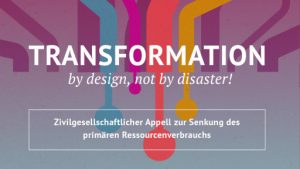

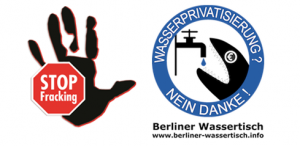
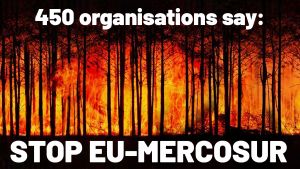

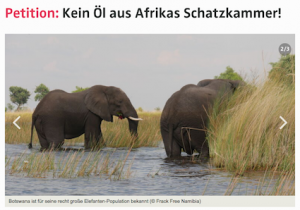

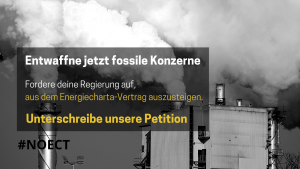
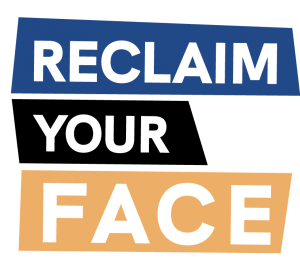
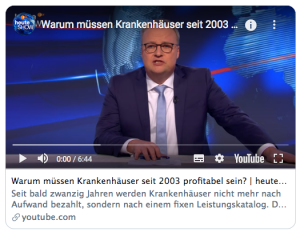





 Pressemitteilungen
Pressemitteilungen